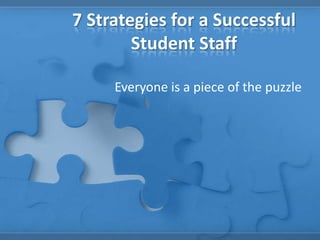7 strategies for a successful student staff
- 1. 7 Strategies for a Successful Student Staff Everyone is a piece of the puzzle
- 2. 1. Be a Strong Role Model ŌĆó Make sure you are modeling appropriate behavior for your staff. ŌĆó Treat your RAs the way you expect them to treat their residents. ŌĆó Model personal wellness. ŌĆó When possible, explain your behavior and the decisions you make to your staff members.
- 3. 2. Maintain Appropriate Boundaries ŌĆó Reserve time and/or space for yourself that you do not share with your staff ŌĆó Decide on how much of your personal life you want to share with your staff. ŌĆó Avoid sharing your personal opinions about your department, division, supervisors, co-workers, College policies, and so on.
- 4. 3. Enforce Expectations ŌĆó Set the tone early ŌĆó Make sure your staff has a solid and thorough understanding of their job responsibilities. ŌĆó Make sure you include time for your staff to share their expectations with you Explain the chain of command and how to appropriately communicate ŌĆó Refer to the expectations you have set ŌĆó Anytime a staff member fails to meet an expectation, take appropriate action quickly to address it. ŌĆó Document expectations
- 5. 4. Make the Most of 1:1ŌĆÖs ŌĆó Consider using a 1:1 report form. ŌĆó Offer constructive feedback. ŌĆó Program Review ŌĆó Future Goals (Work and Personal) ŌĆó Set an Agenda ŌĆó Go somewhere fun
- 6. 5. Remember the Informal Interactions ŌĆó Take the time to do the little thingsŌĆ” ŌĆó Stop and talk to your staff when you see them on campus or around the building. ŌĆó Check in on your RAs as they are doing their RA work. ŌĆó Do rounds of your buildings, and notice the individual touches ŌĆó Whenever you are on a floor, stop by the RAs room ŌĆó Always remember your staff for award nominations and leadership opportunities
- 7. 6. Create Effective Staff Meetings ŌĆó Use an agenda ŌĆó Involve your RAs in the meeting ŌĆó Actively facilitate and manage your staff meeting. ŌĆó Have Staff development time ŌĆó Have a staff mascot and/or recognition ŌĆó Clearly identify any areas where your staff needs further explanation or clarification. ŌĆó Save any questions that do not relate to the whole group until after the meeting wraps up. ŌĆó Consider canceling a meeting or using free time for staff development if you do not have enough on your agenda to warrant a meeting.
- 8. 7. Develop a Staff Team ŌĆó Work to develop a staff identity. ŌĆó Take a staff photo. ŌĆó Foster a team approach to tasks and problems. ŌĆó Encourage and support the group in holding themselves accountable to each other. ŌĆó Plan some informal staff development activities: ŌĆó In addition to your staff meetings, schedule special staff development meetings as needed ŌĆó Make staff development part of every staff meeting.
- 9. Your Turn ŌĆó Questions? ŌĆó Ideas? ŌĆó Comments? ŌĆó Hopes? ŌĆó Dreams? ŌĆó Fears? ŌĆó Emotional Outbursts? ŌĆó Ahhhhhhhhhhhhhhhhhhhhhhhhhhhhhh!









